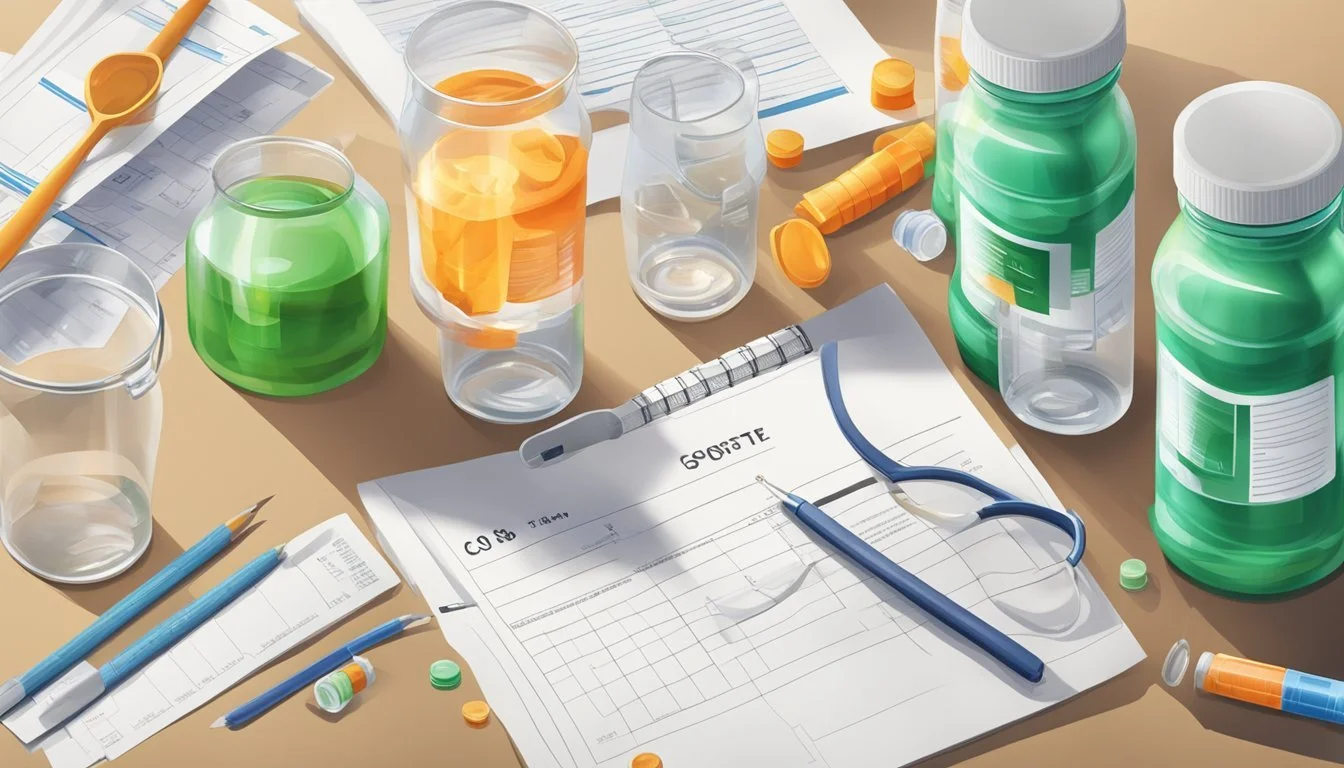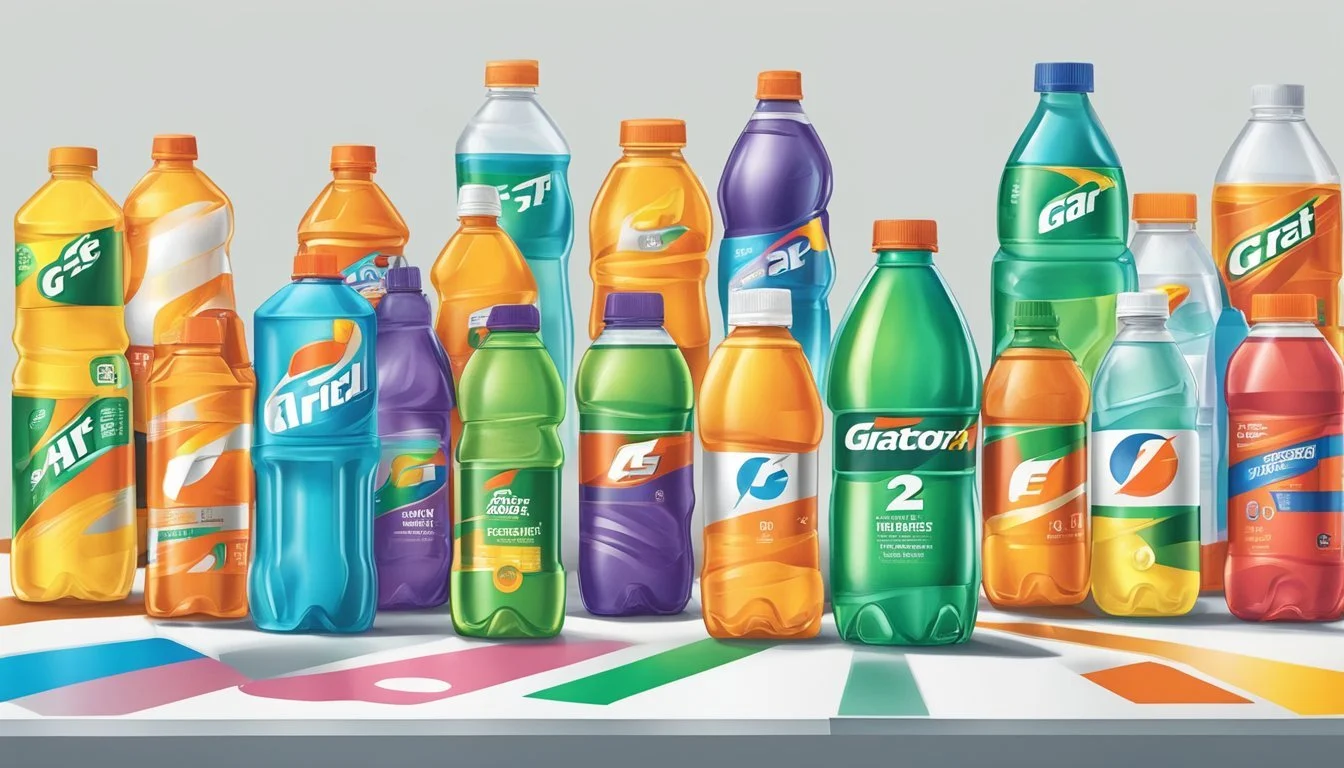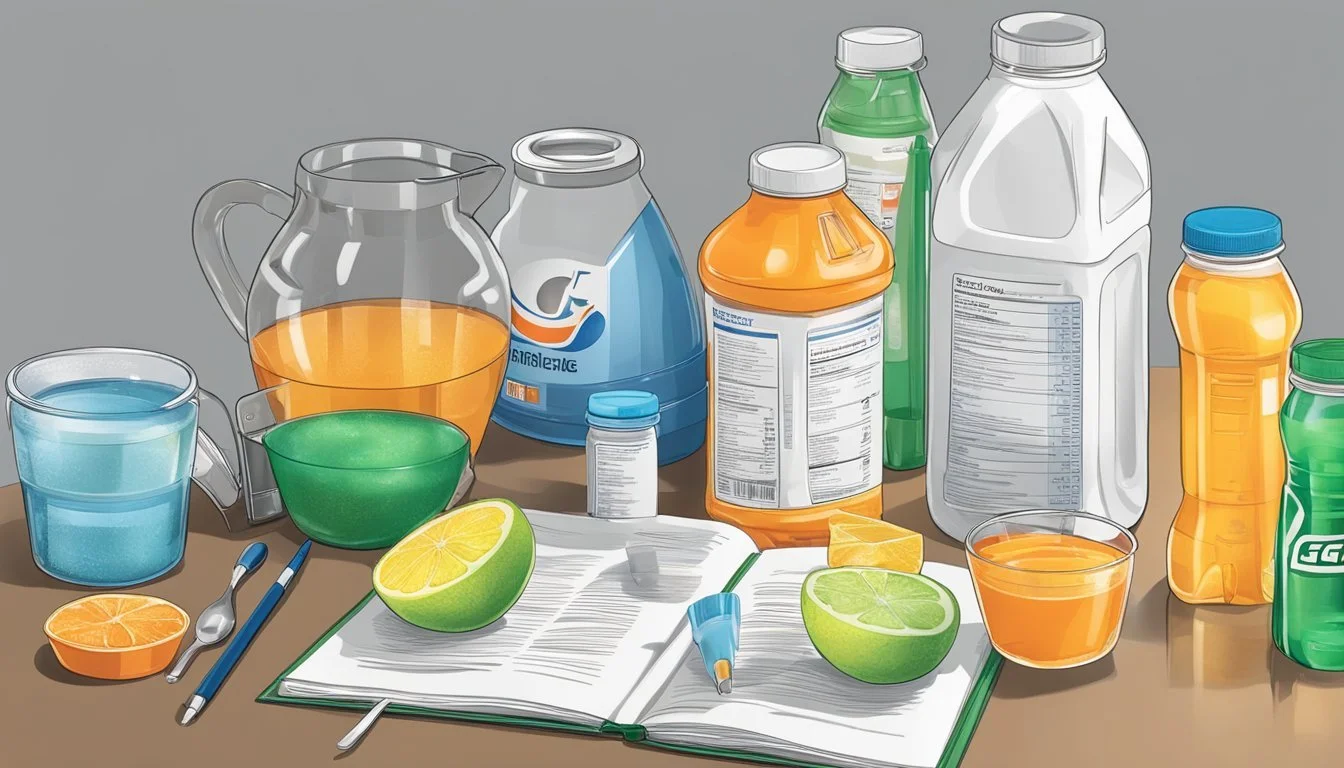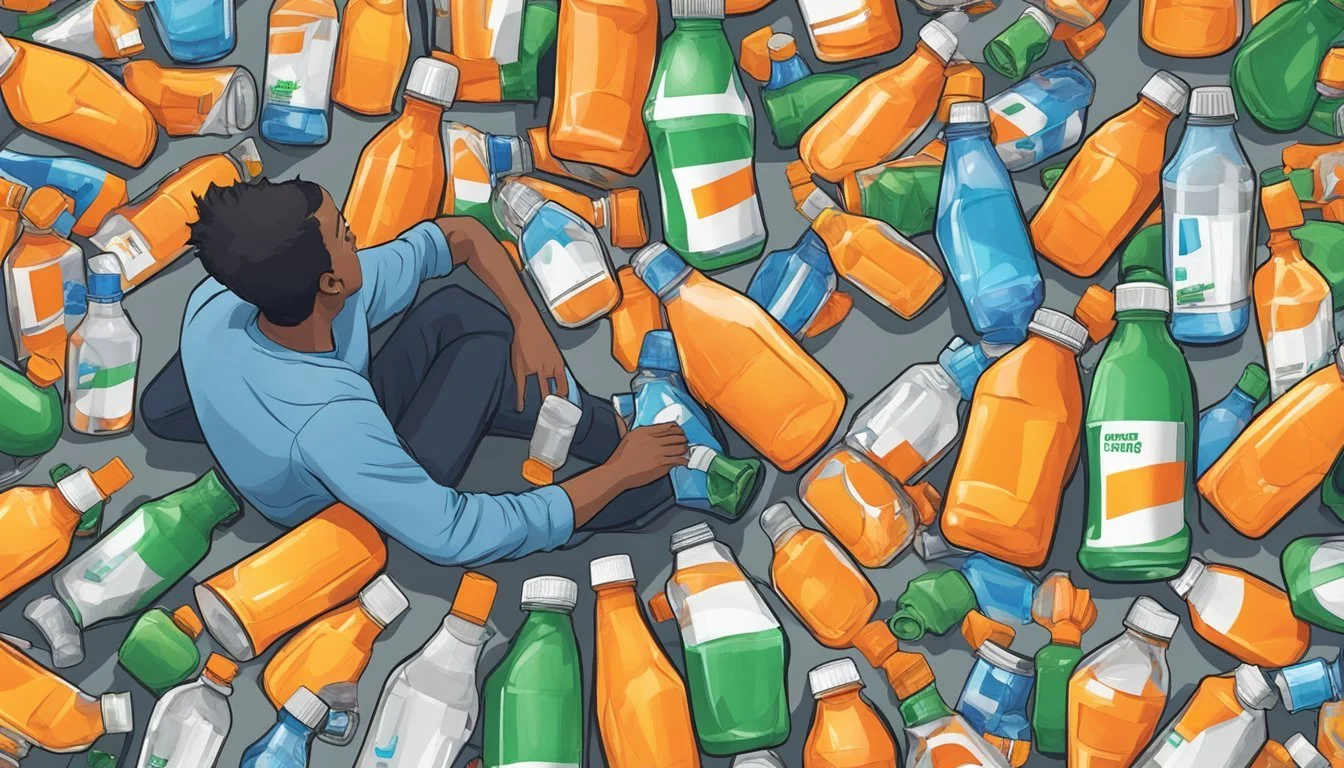How Many Bottles of Gatorade Per Day Is Too Much?
Understanding Healthy Limits
Gatorade is a widely consumed sports drink that is often used for hydration and replenishment of electrolytes lost through sweating during exercise. With its combination of electrolytes, carbohydrates, and water, it's formulated to help athletes maintain performance during prolonged periods of physical activity. The consumption of Gatorade, however, should be tailored to an individual's specific hydration needs, which can vary based on factors like the intensity and duration of exercise, environmental conditions, and one's overall health.
Determining an exact amount of Gatorade that constitutes "too much" can be complex. The drink contains sodium, with one bottle typically providing over 10% of the recommended daily intake according to USDA guidelines. Additionally, a regular 20-ounce serving of Gatorade delivers 140 calories and 34 grams of sugar in the form of carbohydrates. While sugar and electrolytes may be beneficial during exercise, excessive intake outside of active periods may contribute to unnecessary calorie consumption and potential health concerns.
It's essential for consumers to balance their intake of sports drinks like Gatorade with their daily activity levels and nutritional goals. For most people engaging in regular activity, it is generally considered safe to consume 32 to 64 ounces of Gatorade per day. However, for those who are less active or managing conditions such as hypertension or diabetes, it may be prudent to limit consumption to avoid excessive sodium and sugar intake. As hydration needs are highly individual, consulting with a healthcare provider can provide guidance on appropriate Gatorade consumption based on personal health and lifestyle.
What Is Gatorade?
Gatorade is a sports drink formulated to replenish fluids and electrolytes lost during physical activity. Its composition and variety of flavors have made it popular among athletes and casual consumers alike.
Historical Background
Developed by a team of researchers at the University of Florida in 1965, Gatorade was originally created to assist the university's football team in staying hydrated. Named after the team's mascot, the Florida Gators, the beverage quickly gained recognition for its effectiveness in promoting hydration.
Composition and Ingredients
The primary ingredients in Gatorade include water, sugar, dextrose, citric acid, natural and artificial flavors, sodium, potassium, and a mix of other electrolytes and minerals. Gatorade also contains additional components such as monopotassium phosphate, magnesium chloride, and glycerol ester of rosin which aid in its effectiveness.
Varieties of Gatorade
Gatorade has expanded its product line to include various options:
Original Thirst Quencher: The standard version known for its balance of electrolytes and carbohydrates.
G2: A lower-calorie version containing fewer sugars and carbs.
Gatorade Zero: Contains no sugar, appealing to those looking for electrolyte replenishment without the added sugar.
G1: Pre-workout drinks designed to fuel the body before exercise.
G3: Includes protein and carbohydrates for recovery post-exercise.
Nutritional Information
Nutritionally, Gatorade is known for its combination of water, electrolytes like sodium and potassium, and carbohydrates primarily in the form of sugars. Here is a brief overview of the nutritional content in a standard 20-ounce bottle of Gatorade:
Calories: 140
Total Carbohydrates: 36g
Sugars: 34g
Protein: 0g
Fat: 0g
Sodium: 270mg
Potassium: 75mg
Safety and Regulatory Aspects
Gatorade complies with food safety standards and regulations. It contains food dyes, sweeteners, and flavors that are approved for use by regulatory bodies such as the FDA. The drink also offers alternatives like Gatorade Zero for those wanting to avoid sugar or artificial sweeteners.
Consumer Perception and Market Adoption
Thanks to its research-backed formulation and effective marketing, Gatorade has garnered widespread consumer acceptance and dominates the sports drink market. It is perceived by many as a dependable source of hydration, especially during and after exercise or any athletic performance.
Benefits of Gatorade
Gatorade offers advantages for individuals engaged in vigorous physical activities by aiding hydration and supplementing the body with critical substances lost during exercise.
Hydration and Rehydration
Gatorade is designed to assist with hydration, which is vital as the body loses fluids through sweat during physical activity. Consuming sports drinks like Gatorade can help replenish these fluids more effectively than water alone, especially during endurance activities like running, as it encourages drinking by virtue of its taste.
Electrolyte Replacement
During intense exercise, athletes lose electrolytes through sweat, which are essential for maintaining fluid balance. Gatorade provides sodium and potassium, key electrolytes that help rehydrate the body and replenish electrolytes, thereby preventing dehydration.
Energy Provision
The calories in Gatorade serve as fuel for the body. It contains carbohydrates, in the form of sugars, that can be quickly absorbed and utilized for energy, replenishing glycogen stores during prolonged physical activity.
Enhanced Athletic Performance
For athletes, maintaining hydration and electrolyte balance contributes to maintaining optimal athletic performance. The intake of Gatorade during exercise can support energy levels and help sustain performance, particularly during prolonged bouts of exercise or physical activities in hot climates.
Potential Health Concerns
When considering the consumption of Gatorade, it's crucial to assess potential health impacts stemming from its ingredients, including excess sugar and sodium, as well as artificial additives that may contribute to various health issues.
Sugar and Caloric Content
Gatorade contains a notable amount of sugar, with a 20-ounce serving providing around 34 grams of sugar, which is close to or surpasses the daily recommended limit for adults. Regular consumption can lead to an intake of excess calories, contributing to weight gain and increasing the risk of obesity.
High Sodium Levels
A single bottle of Gatorade can contain sodium levels that are high enough to affect blood pressure. With the American diet already high in sodium, the additional intake from Gatorade could elevate the risk of high blood pressure.
Artificial Additives
Gatorade's formulation includes food dyes and artificial sweeteners. These substances can have varying effects on health, with some concerns over their contribution to hyperactivity in children and potential long-term health risks.
Correlation with Health Conditions
High consumption of sports drinks like Gatorade may correlate with health conditions such as type 2 diabetes. The combination of high sugar content and added calories can affect insulin sensitivity and management of blood sugar levels.
Effects on Dental Health
The acidity and sugar content in Gatorade can be detrimental to dental health, potentially leading to tooth decay. Frequent exposure of teeth to sugary drinks is known to contribute to the erosion of tooth enamel.
Consumption Recommendations
Understanding the recommended consumption amount of Gatorade hinges on several critical factors: the sugar and calorie content, the need for hydration and electrolytes, and the potential health implications.
Gatorade for Athletic Use
For individuals engaging in moderate to high-intensity physical activity, Gatorade can serve as a tool to replenish electrolytes and maintain fluid balance. Athletes typically consume 32 to 64 ounces (946 to 1892 ml) during extended periods of exercise to support performance and recovery. It's vital they monitor fluid intake to prevent overconsumption.
Daily Intake Considerations
Non-athletic individuals should be more conservative with Gatorade intake due to its calorie (140 calories per 20 ounces) and sugar content (34 grams per 20 ounces). Excessive daily consumption can contribute to weight gain and related health issues. A balanced approach is to consume Gatorade in moderation, tailored to one's daily caloric and hydration needs.
Special Populations
Children, individuals with diabetes, or those concerned with cardio health should limit consumption due to the sugar content and risks associated with high sugar intake. These groups may need to consult with health professionals to determine appropriate use of sports drinks like Gatorade, which are designed for replenishing energy and fluids during physical activity.
Alternatives to Gatorade
When Gatorade is not necessary, or a healthier option is preferred, water remains the most favorable choice for staying hydrated. Other alternatives include drinks with lower sugar content or those that provide electrolytes without added sugars and calories. Options with natural flavors and minerals can also aid in hydration without the extra calories.
The Science Behind Hydration
Hydration is crucial for maintaining fluid balance and ensuring the proper function of the body's physiological processes. Adequate fluid intake is essential, especially during physical activity, to offset water loss from sweat and to maintain performance.
Understanding Fluid Balance
Fluid balance in the body is a state where the amount of water lost is equivalent to the amount of water consumed. Water is lost through various means, such as sweat, urine, and breathing. Dehydration occurs when fluid loss exceeds intake, and can lead to symptoms like dry mouth, fatigue, and dizziness. Replenishing lost fluids is necessary to restore this balance, typically through the consumption of water or sports drinks that contain electrolytes essential for hydration.
Role of Electrolytes in the Body
Electrolytes, including sodium, potassium, chloride, phosphate, calcium, and magnesium, are vital minerals that help maintain the body's fluid balance, muscle function, and nerve signaling. They are typically lost through sweat during exercise. Sports drinks are formulated to replenish electrolytes and water, which is why they are a popular choice for individuals engaged in prolonged physical activity.
Exercise-Induced Hydration Needs
During exercise, the body can lose significant amounts of water and electrolytes through sweat. This can affect performance and lead to dehydration if fluids are not adequately replaced. Researchers suggest that the ideal volume and timing of hydration varies depending on the individual and the intensity of the activity. It's essential to stay hydrated but also to avoid overhydration, which can lead to hyponatremia (low blood sodium levels).
Research on Sport Drink Efficacy
Sports drinks have been researched extensively for their role in hydration and performance enhancement. Studies conducted by universities and sports science labs have found that sports drinks can be effective for rehydrating and maintaining endurance during prolonged activities. The research suggests sports drinks can be more effective than water alone in situations where rapid replacement of electrolytes and fluids is necessary, such as during intense exercise or in high heat. However, it is important for individuals to consider the added sugars and calories in sports drinks and consume them in moderation.
Conclusions
When consuming Gatorade, individuals ought to weigh the benefits of electrolyte replenishment against the potential health risks associated with excessive sugar and sodium intake. For those engaged in intense physical activity or endurance sports, Gatorade can be a valuable tool for hydration and maintaining electrolyte balance. However, it's essential to recognize that these benefits are most appropriate under conditions of extended and vigorous exercise.
The typical 20-ounce bottle of Gatorade offers 140 calories and 36 grams of carbohydrates, with 34 grams deriving from sugars. This amount can exceed or meet the daily sugar intake recommendations for adults, which is no more than 36 grams for men and 25 grams for women.
A reasonable guideline for Gatorade consumption could be:
Physical Activity Level: Moderate to High Intensity
Recommended Quantity: 32 to 64 ounces per day
Health Consideration: Tailor intake to individual hydration needs
Consumers should consider their overall diet and health goals. For sedentary individuals or those with a low level of physical activity, drinking Gatorade could contribute to unnecessary calorie consumption and an increased risk of health issues such as weight gain and type 2 diabetes.
In essence, moderation is key, and water remains the most effective and health-conscious choice for staying hydrated in most circumstances. Those choosing to drink Gatorade should ensure it aligns with their hydration needs, nutritional goals, and health considerations.
References
The information provided in the article is corroborated by various health and nutrition sources:
Verywell Health discusses dietary recommendations for sugar and sodium intake and mentioned this in the context of Gatorade's nutritional content.
livestrong provides insights into potential adverse effects from excessive consumption of Gatorade, including its calorie and sugar content.
Verywell Fit elaborates on the potential weight gain from daily consumption of Gatorade based on its calorie content.
Teesnature recommends a safe range for Gatorade consumption tailored to different factors such as activity level and individual needs.
Medical News Today evaluates the impact of sugar and food dyes found in Gatorade on health conditions like weight gain and type 2 diabetes.
The details were extracted from the snippets provided by the user and are consistent with general dietary guidelines. These references help shape an understanding of the implications of consuming Gatorade in various quantities.








